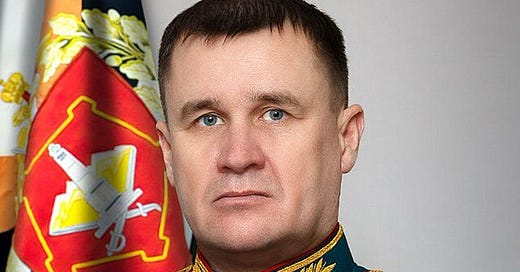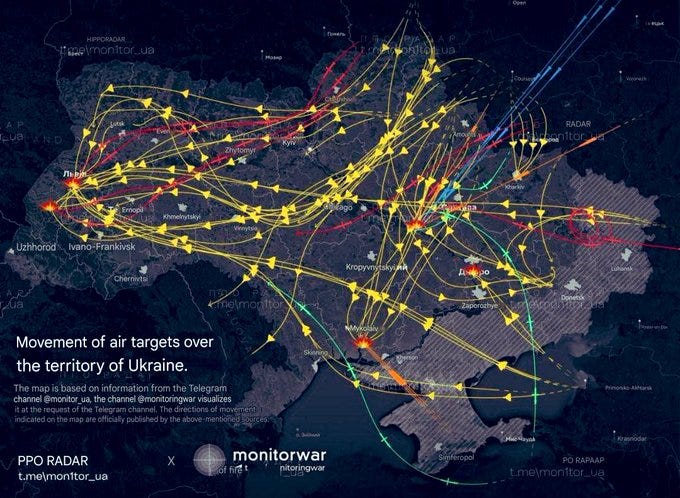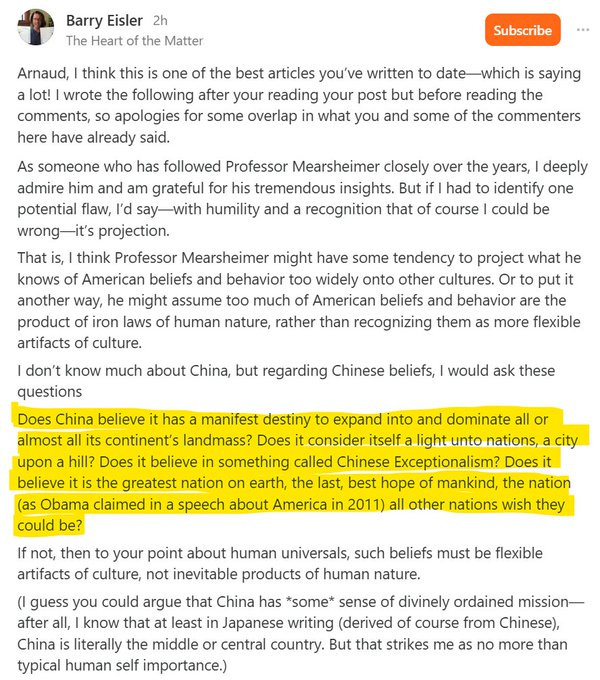Russia just keeps probing and advancing, avoiding casualties to the max extent possible. But things are starting to happen. Putin recently stating that, basically, all Ukraine is Russian has to be taken as some sort of signal. The military buildup to start clearing all of Zaporozhye looks meaningful, as well. And don’t forget Kherson. There have been persistent rumors of Russian forces operating now on the west side of the Dnieper. And ya gotta take a guy with 14 lives seriously:
Aleksey Berezutski @aleksbrz11
General Andrey Mordvichev, who was killed 14 times by the Western media: Ukraine will soon have no connection with the sea.
8:41 AM · Jun 28, 2025
The huge Russian strike last night has been making headlines, and Thomas Keith has a good analysis of its significance. BTW, my guess is that Thomas Keith is a frontman for a consortium, a bit like sundance/CTH. No one person can possibly cover as much territory as he does. Take it from me. For starters, he wouldn’t have time to make decent coffee.
Thomas Keith @iwasnevrhere_
Last night’s strike package represented one of the most complex saturation attacks Russia has mounted since autumn, choreographing waves of loitering munitions and stand-off weapons to erode Ukrainian air defenses across the entire depth of the country. Over 450 combat drones, identified by their erratic yellow flight-path arcs on PPO Radar’s visualization, fanned out from deep staging areas to Lviv, Rivne and Ivano-Frankivsk, forcing Ukrainian AD to chase dozens of inbound vectors rather than massing on any single axis. Simultaneously Tu-95Ms disgorged Kh-101/Kh-55 cruise missiles that traced long, arching courses toward central hubs, while Kalibr launches from the Black Sea carved straight-line corridors converging on Mykolaiv and Zaporizhzhya.
Layered above these formations were high-speed injections of Kh-47M2 Kinzhal hypersonics and 9M723 Iskander-M ballistic salvoes, their pinpoint arcs, rendered in red and blue on the map, snapping precision holes through command nodes in Cherkasy and Kremenchug. The introduction of North Korean KN-23 SRBMs added a third missile family to the barrage, signaling a willingness to source foreign munitions to maintain pressure. This multi-vector choreography wasn’t a random show of force but a deliberate test of Ukraine’s missile inventory, compelling interceptors to split fire between cruise, ballistic and loitering threats.
Strategically the campaign aims to throttle Ukraine’s repair and resupply pipelines rather than merely scorch the frontlines. By extending swarm strikes into Lviv region and probing AD coverage over major western logistics hubs, Russia seeks to preempt reinforcement convoys and degrade repair depots that would service PATRIOT batteries. The simultaneous pounding of industrial complexes in Zaporizhzhya and the rail junction at Kremenchug underscores a doctrine of systematic infrastructure attrition. In aggregate this operation signals a shift from episodic shock raids to continuous degradation warfare, designed to bleed Ukrainian air defenses dry, disrupt Western aid corridors and recalibrate the conflict’s momentum on Moscow’s terms.
Two things immediately jump out from this map. One is the concentration on Lwiw in the west—the hub for incoming supplies from NATO. The second is the concentration on the the key industrial and rail hub of Kremenchug on the upper middle Dnieper. The intent, at a guess, is to isolate Ukrainian and NATO forces east of the Dnieper from resupply, while Russian offensives from the north and south begin moving to form a super cauldron. Something of the sort. But, yes, Odessa also took a beating.
China. Everyone knows that Prof Mearsheimer has a bugbear about “containing” China. He holds to the improbable view that a key to America’s national security and overall well being is to project our military thousands and thousands of miles across the world’s widest ocean to “contain” a vast Asian civilizational and economic powerhouse that has all sorts of links to the rest of Eurasia. Arnaud Bertrand has set out to address Mearsheimer’s views—which I’ve always found to be utterly unpersuasive and frankly scary. Bertrand does this by turning Mearsheimer’s professed foreign policy “realism” back against the prof.
Arnaud Bertrand @RnaudBertrand
I've been wanting to do this for a long time: write a comprehensive article on why Mearsheimer is wrong on China.
I actually had a debate with John via message 2 years ago on this very question but we sort of left it in in limbo, with him doubling down on his call that the US should "contain" China, and me replying that although it might make sense from a selfish US standpoint (even though I even highly doubt that), a true realist theorist shouldn't base his theories on the passport he happens to be born with.
My article goes much further, demonstrating that Mearsheimer is wrong on China in 4 key ways:
1) He promotes what he condemns. He is one of the fiercest critics of U.S. behavior on the world stage and he has brilliantly demonstrated that the more power the U.S. holds, the more destructive and reckless it gets. Yet his position on China calls for preserving and expanding the very power he shows consistently produces strategic disasters and immense human suffering.
2) For a realist, he’s not realistic. His theory predicts that America will inevitably contain China's rise, but the actual evidence not only shows that the opposite is true, but that containing China is now structurally impossible.
3) Why would this time be different? His most accurate predictions ironically come from understanding that America consistently acts against his own realist logic - getting bogged down in Ukraine, Gaza, and Iraq. So why would the country he consistently says ignores his realist framework suddenly do so when it comes to China?
4) If America doesn't act 'offensive realist', why would China? If his theories, by his own admission, consistently fail to predict his own country's behavior, why trust them to predict China's - especially given China's completely different cultural context that he's unfamiliar with?
"Why Mearsheimer is wrong on China"
2:53 AM · Jun 26, 202
MoA gets the thrust of Bertrand’s argument. I would add that a civilizational area as large as China—century by century, even millenium by millenium—China has made up about 20% of the world’s economic activity. Arguably, China can’t NOT be a hegemon:
Moon of Alabama @MoonofA
Jun 26
Betrand's last sentence is most important.
Mearsheimer warns that China wants to become a hegemon.
He then provides historic examples from various western hegemonies as proof for his thesis.
He ignores that China's long history shows a much different behavior.
It is their cultural context that pushes western countries to strive for hegemony.
In Chinese cultural context such behavior has negative associations. It is therefore not striven for.
To this point Bertrand seems on solid ground—a liberal Westerner critiquing another liberal Westerner. However, a reader sent a question to Bertrand, which led to this further exchange and elaboration of his views. I’ll just say outright that this reads like a string of non sequiturs. Bertrand and his friend reveal themselves as just as unable to understand non-Western cultures as is Mearsheimer. I agree that China doesn’t view itself as on a mission of Manifest Destiny. But I don’t think that excludes a view of Chinese Exceptionalism. At the end I quote a Chinese reader for support, who gently pokes fun at Bertrand’s a bit over the top China apologetics.
Arnaud Bertrand @RnaudBertrand
Jun 26
This is a fantastic question by my friend @barryeisler on my latest article on "Why Mearsheimer is wrong on China", and one that I see asked very often, so let me try to answer it here.
Does China have a US-like Manifest Destiny, i.e. a belief that it should spread its system, ideals and culture because they are superior to others?
The answer is that the exact contrary is true: China’s DNA is to build walls, to protect itself from external influence to keep its specificities and what makes it different, which incidentally is a core reason why it is the most enduring civilization in human history.
Most people do not understand this but those are somewhat paradoxically two sides of the same coin: if you believe in proselytism, in spreading your beliefs and culture everywhere, you inevitably transform them into universal abstractions, losing the specific historical, geographical, and cultural roots that gave them their original power and meaning.
In short, if you believe your culture is so much "better" that everyone needs to adopt it, "better" inevitably loses all its meaning because it can only exist in relation to "different," and once everything becomes the same, there is no more basis for comparison.
This is actually a fundamental concept in ancient Chinese philosophy: in the concept of the Yin-Yang, the very basis of existence of either the Yin and the Yang is that they exist in relation to and define each other - neither can exist independently, and the elimination of one would mean the destruction of both. Without darkness, there can be no light, without cold, no heat. And without difference, culture itself disappears.
All this to say that to the Chinese the very concept of Manifest Destiny represents a profound philosophical contradiction that inevitably leads to the erasure of what makes any civilization worth preserving in the first place.
And all this also demonstrates once more how ridiculous it is to project Western intentions onto China, as Mearsheimer and others all too commonly do: by assuming that their own cultural DNA is universal human nature, they end up analyzing a China that exists only in their imagination.
And the deeper irony is that it is the same universalizing mindset that created Manifest Destiny that also creates the blindness to the fact that not everyone thinks like Americans do.
While we don't believe in a manifest destiny, we most certainly believe that we are better than everyone else. China puts the middle in the middle kingdom.







Russia did not annex Donetsk, Luhansk, Zaporizhzhia and Kherson provinces in September, 2022 and Crimea in 2014. All five areas held internationally-monitored elections, attended by large majorities, that voted in large majorities to secede from the Ukraine. After those elections, the Duma accepted their applications to become part of the Russian Federation, again in the case of Crimea.
Mark, with all due respect (and a ton is due) I think YOU are a consortium! No one person can possibly cover as much territory as you do. I know I do not have the time to keep up with you even as just a reader. I suspect credit is due to a person named Mary Ellen. And your views are suspiciously aligned with one Michael Hudson:
https://geopoliticaleconomy.com/2025/06/22/michael-hudson-war-iran-us-unipolar-control/
Thank you so much for all you do. You make/take the time to intelligently educate all of us with knowledge far beyond what we would be able to easily obtain otherwise. The value of what you do cannot be measured in terms of its effects but I think all of us know how important it is. And you do all this without the expectation of compensation (either monetarily or in any other way). God bless you and your efforts to reveal and share the truth. Thank you.